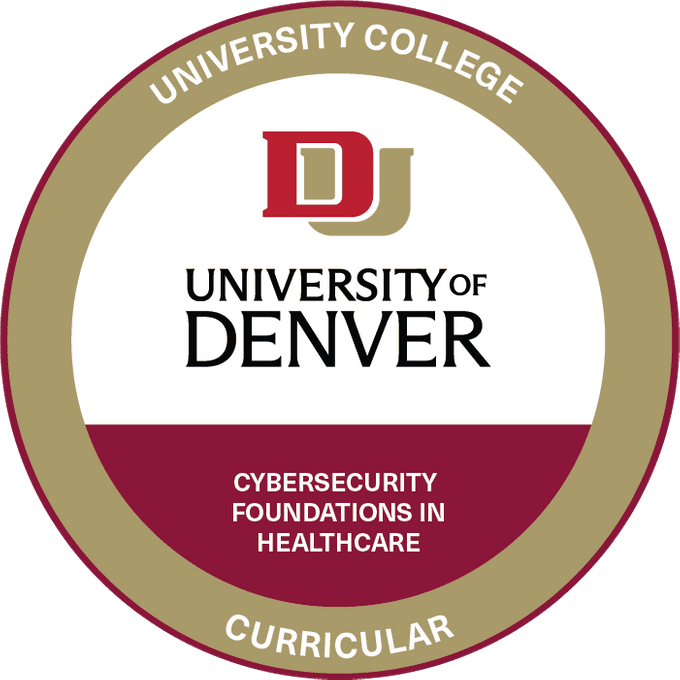Master’s Concentration
Health Data Utilization and Analysis
If you have an interest in the larger landscape of health data, the Health Data Utilization and Analysis concentration builds your skills in data mining, programming, ethics, and security practices for effective healthcare problem solving. Learn the foundations of healthcare data security, regulatory compliance, and ethics, and analyze a variety of health data sets to improve healthcare delivery and outcomes. You’ll problem solve using Python and SQL, and learn data design and protection techniques. Through case studies and practical application, you’ll gain the skills to transform data into insight.
Let us help you succeed.
*Indicates a required field.
Top-ranked, career-focused education in a flexible format.
At a Glance
Classes Begin
September 9
Term Length
10 Weeks
Master's Degree
Tuition
$40,032

Top-Ranked University
U.S. News & World Report Rankings

Talk to an Enrollment Manager
Lindsey Ford
303-871-2492
Schedule an appointment
Email me
If you plan to study on an F-1 or J-1 visa, contact Tracy Joosten.
Free Application
University College is committed to educational access, and given the difficult circumstances currently impacting millions of people, we are waiving application fees.
Skills You’ll Learn
Draw useful insights from data using data integration, predictive analytics, and data visualizations
Develop data queries and structured coding to solve health-related data challenges
Apply health data mining techniques to make decisions that improve healthcare delivery
Curriculum
Master of Science in Health Informatics with a concentration in Health Data Utilization and Analysis requires completion of 48 credit hours (12 courses).
6
Core Courses
6
Concentration
Courses
Featured Instructors
Sample Schedule
Plan out your schedule and determine your preferred timeline for completing your master's degree—finish in as few as 18 months or take up to five years.
Interested in a graduate certificate?
Explore our six course graduate certificate in Health Data Utilization and Analysis.
Interested in a digital badge?
Learn about badge requirements, how to apply, and more!

Cybersecurity Foundations in Healthcare
Take a Course Before You Apply
Career Outcomes
Predicted outcomes for graduates of Health Data Utilization and Analysis
Health data is estimated to grow at a compound annual growth rate of 36%, faster than the data growth in most other industries.
Health care occupations are expected to grow by 13% between 2021 and 2031, and 1.9 million jobs will open up each year, the Bureau of Labor Statistics projects.
Employment of health information technologists and medical registrars is projected to grow 16% from 2022 to 2032, much faster than other occupations, according to the BLS.
Job Titles
Health Information Services Manager
Healthcare Data Analyst
Informatics Analyst
Nursing Informaticist
Director of Health Analytics
Data Modeler
Quality Analyst
Health Informatics Consultant
Healthcare Data Analyst Salary: National Average
$91,000
(Lightcast)
Get Ahead with Career Services
One-on-one career coaching and mock interviews
Job database dedicated to DU students and alumni
Résumé and cover letter guidance
Hear from Our Students
Theme: Job Satisfaction
Health Informatics at the University of Denver
Flexible Online Classes
We understand the demands of balancing work, friends and family, and school can be challenging. That's why at University College, you can complete your program entirely online. Our online learning platform makes it easy to work anywhere at any time.
Accreditation
Higher Learning Commission
University College programs maintain the highest level of accreditation offered by The Higher Learning Commission, one of the regional accrediting bodies recognized by the federal government. The University of Denver and all of its academic programs are regionally accredited by this commission, and regional accreditation is the highest standard for universities in the United States.
HIMSS Organizational Affiliates
The HIMSS Academic Organizational Affiliate program shares industry knowledge and educates our students on critical issues in health information and technology by offering complimentary student memberships to HIMSS and other key benefits.
spacer
Curriculum Alignment
To ensure our programs meet industry needs, the curriculum is closely aligned with national organizations such as the American College of Healthcare Executives and Medical Group Management Association, as well as local organizations such as the Denver Medical Study Group.
Take the Next Step










